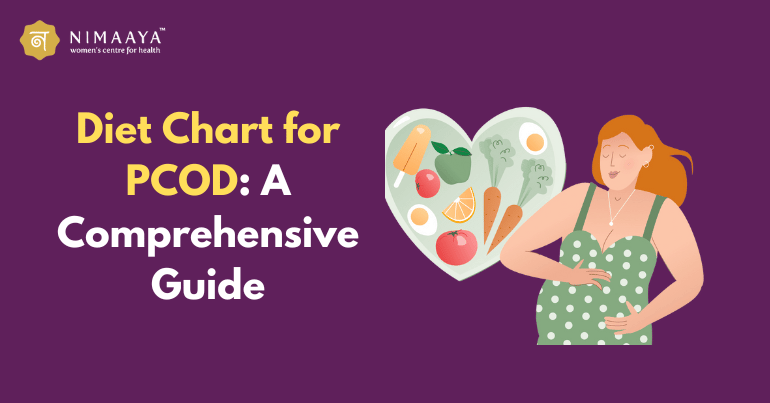In a world where women’s health is gaining the spotlight it rightfully deserves, conditions like Polycystic Ovary Syndrome (PCOD) are becoming increasingly prevalent. As women navigate through the challenges posed by PCOD, a crucial aspect that demands attention is their diet. A well-structured diet chart for PCOD can play a pivotal role in managing symptoms, promoting weight loss, and supporting overall well-being. In this comprehensive guide, we will delve into the intricacies of a PCOD-friendly diet, exploring various aspects such as weight loss, pregnancy, and the vegetarian perspective.
What is PCOD and Its Diet?
Polycystic Ovary Syndrome (PCOD) is a common endocrine disorder that affects people assigned to females at birth. It is characterized by hormonal imbalances, irregular menstrual cycles, and the presence of cysts on the ovaries. The intricate interplay of hormones, particularly elevated levels of androgens and insulin resistance, contributes to the manifestation of PCOD symptoms. When it comes to managing PCOD, diet plays a pivotal role. A carefully curated diet chart for pcod aims to address the underlying hormonal imbalances and mitigate associated symptoms.
Emphasizing nutrient-dense foods, the diet typically includes a balance of proteins, carbohydrates, and fats. Specific dietary considerations may also be made for weight management, as excess weight can exacerbate hormonal disruptions. Additionally, a PCOD diet may incorporate superfoods known for their positive impact on hormonal health. Whether tailoring the diet to address weight loss, accommodating a vegetarian lifestyle, or crafting a plan for pregnancy, understanding the nuances of a PCOD-specific diet is crucial for individuals navigating this common yet complex condition.
A Diet Chart for PCOD Patient
Polycystic Ovary Syndrome (PCOD) necessitates a thoughtful and personalized approach to nutrition. A well-structured diet for PCOD patients plays a pivotal role in managing symptoms, supporting hormonal balance, and promoting overall well-being. Here’s a breakdown of a day’s worth of meals, tailored to suit the unique needs of individuals grappling with PCOD.
‣ Breakfast:

• Quinoa Breakfast Bowl:
Start the day with a quinoa bowl loaded with fresh berries and nuts. Quinoa is a high-fiber grain that aids in regulating blood sugar levels, an essential consideration of diet chart for pcod patients. Berries provide antioxidants, while nuts offer healthy fats and proteins.
• Green Smoothie:
Blend spinach, kale, a banana, and a handful of almonds for a nutrient-packed green smoothie. This breakfast option is not only rich in vitamins and minerals but also contributes to maintaining a healthy weight, a crucial aspect of PCOD management.
‣ Mid-Morning Snack:
• Greek Yogurt Parfait:
Opt for a Greek yogurt parfait layered with granola and mixed fruits. Greek yogurt is an excellent source of protein and probiotics, supporting gut health. The combination of yogurt, granola, and fruits ensures a satisfying mid-morning snack that keeps energy levels stable.
‣ Lunch:

• Salmon and Quinoa Salad:
Include a generous serving of salmon in a quinoa salad for a protein-packed lunch. Salmon is rich in omega-3 fatty acids, which have anti-inflammatory properties and can aid in managing PCOD symptoms. Quinoa adds fiber and essential nutrients to the mix.
• Vegetable Stir-Fry with Tofu:
A colorful vegetable stir-fry with tofu provides a balance of proteins and carbohydrates. Tofu, derived from soy, is a plant-based protein that complements the nutrient requirements of PCOD patients. Load up on a variety of colorful vegetables for added vitamins and minerals.
‣ Afternoon Snack:
• Avocado Toast with Whole Grain Bread:
Savor a slice of whole-grain bread with avocado mash on top. Avocado is rich in healthy fats and fiber, promoting satiety and helping to regulate blood sugar levels. This snack provides sustained energy for the afternoon.
‣ Dinner:

• Balanced Plate:
Opt for a well-balanced dinner that includes a mix of protein, complex carbohydrates, and vegetables. Consider options like grilled salmon with quinoa and roasted vegetables—a wholesome combination for PCOD patients.
• Quinoa and Lentil Soup:
Conclude the day with a comforting quinoa and lentil soup. Lentils are a great source of plant-based proteins and fiber, contributing to overall digestive health. Quinoa adds a nutritional boost, making this soup a wholesome and nourishing choice.
‣ Bedtime Snack:
• Chamomile Tea and a Handful of Almonds:
A cup of chamomile tea can aid in promoting relaxation and better sleep quality, crucial for individuals with PCOD. Pair it with a handful of almonds for a light and nutritious bedtime snack. Almonds provide magnesium, a mineral known for its sleep-inducing properties.
Also Read: Exploring the Top 5 IVF Centers in Surat for Successful IVF Journey
Understanding the Significance of a PCOD Diet Chart
Understanding the significance of a diet chart for pcod is paramount in navigating the multifaceted challenges posed by Polycystic Ovary Syndrome. This tailored dietary approach plays a pivotal role in achieving hormonal equilibrium, a cornerstone for managing PCOD effectively. By focusing on nutrient-dense foods and incorporating a PCOD diet chart for weight loss, individuals can address insulin resistance and tackle the interconnected issue of excess weight, thereby alleviating symptoms associated with PCOD.
Moreover, recognizing the diverse phases of a woman’s life, our guide underscores the adaptability of the diet chart, whether it’s tailoring it for pregnancy or catering to those who opt for a vegetarian lifestyle. In essence, the significance of a diet chart for pcod lies not only in its ability to regulate hormones but also in its versatility to meet the unique nutritional needs across different life stages, fostering a holistic and sustainable approach to managing PCOD.
Navigating the Dietary Landscape with PCOD
As women seek to manage PCOD through dietary interventions, it is equally important to consult healthcare professionals for personalized guidance. A collaborative approach involving the best gynaecologists in Ahmedabad, such as those at Nimaaya Hospital in Ahmedabad, can provide valuable insights and tailored recommendations.
Choosing the Right Gynaecologist
Selecting the best gynaecologist is pivotal in managing PCOD effectively. For women residing in Ahmedabad, the quest for the right healthcare professional can be simplified by considering factors such as experience, expertise, and patient reviews. The right gynaecologist can offer comprehensive care, including dietary guidance like a diet chart for pcod specifically.
Conclusion:-
In the complex landscape of PCOD management, a well-structured and personalized diet chart emerges as a beacon of hope. This comprehensive guide not only explores the intricacies of crafting an effective PCOD diet plan but also emphasizes the importance of consulting the Best Gynecologists and seeking support from reputable healthcare institutions like Nimaaya Hospital. By integrating these components, women can embark on a holistic journey towards wellness, reclaiming control over their health and embracing a life free from the burdens of PCOD.











